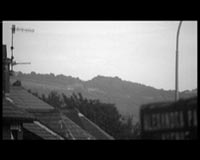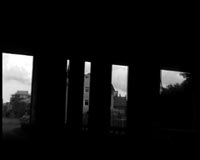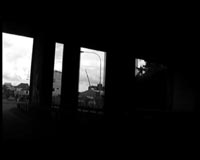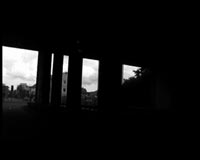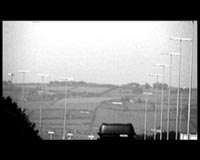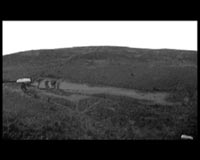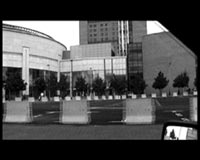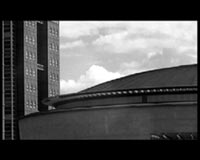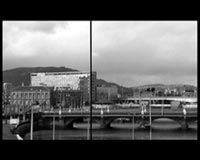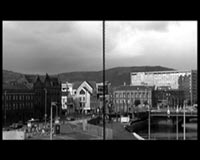Daniel Jewesbury
Scopo
This is a talk about the unrepresentability of Belfast. It is not a representation of Belfast, it is a failure to make such a representation, and it is a comment on the unknowability of all cities. A city only becomes a city when it's too big for one person to describe.
A word on representation: representation is about making totalising statements, art - visualising - is about making confident assertions. So is criticism: 'it does this, but it should do this, then it would be better'.
Visualising and representation are moments of trauma. They fix the immaterial and partial and make it concrete.
And a word on failure: This isn't just some postmodern game of deferring any political or ideological position, I'm talking about failure as a strategy, one which enables us to understand that 'objective reality' is something we are engaged in constructing, from the inside, not something we want 'access' to from the outside.
Perhaps people here can help me to construct Belfast for them, people who've never been there. To construct it as an image.
One more note: the city doesn't look like this any more. This was just a moment in a transition.
One more note: I'm not from Belfast.
*****
There used to be a furniture shop in Belfast called Habitat, a big UK store. It said, 'It's home time' in their window. It's home time. It's over, you can go home now. The shop has closed down now. Some say they refused to pay their protection money. Welcome home. In Dublin the signs by the new riverside apartments used to say 'If you lived here you'd be home now'. They got the idea from the States. Martha Rosler once organised a project about public art and public space called 'If you lived here'.
[pause]
If we lived here...
Where's home? How do you know when you're home? Who says where's home? Remember David Byrne singing 'this is not my beautiful house'? Remember what Goldilocks got up to while the Three Bears were at Habitat? What I'm trying to say is, do you ever get the feeling that someone's been re-arranging the furniture?
[pause]
It's over, you can go home now. Just like poor Judy Garland, it took us too long (thirty years too long) to realise that there's no place like home.
[pause]
Do you mind me saying 'us'?
[pause]
Ivor Cutler, the Scottish poet, says home's home wherever you are. Is home here, now, or is it somewhere in the future? Is it the place we are or the place we want to get to? Can we ever arrive there? Can we ever get home? Did we ever leave? Show me the way to go home.
[pause]
I'm not from round
here.
We're not from round here.
I don't think we should be round here.
Turn the radio off.
Turn the radio off. Park up here. Do you know where we're going?
[pause]
[video on]
(30 mph and the city never leaves us behind. We could go all night and never leave. We could go all night and never be anywhere. Are we moving at all?)
Where the hell is
everybody?
Find a road that makes sense and get a bit of speed up.
[Quickish]
(Parallel lines draw us into the distance, even as we draw them before
us, the two centres of everything, the vanishing point and the eye. All
things arranged between these two points, all things arranged to be viewed
from here. I could ask you to drive all night, perhaps we could get out
of here.)
[pause]
[Urgent]
Turn the radio off. Turn off the lights. Sit here all night with the engine
running.
Pull up.
Get out of the way. Let me see. Turn the radio off, I can't see.
Driving on the edge of town.
[pause]
[video off]
(Driving on the edge of town is making me edgy. We'll never arrive because the place we're going isn't anywhere, we might be there already but we carry on moving, carry on going nowhere.)
Keep right.
[Rhythmic. Urgent]
Get me out of here. Get away from the edges. 'Driving in your car, I never,
never want to go home… Take me anywhere, I don't care.'
My eyes hurt. Turn the radio off.
[Forward]
(We all keep driving around something, something that's too big for us
to perceive, to comprehend, to see. Everybody, everything here, all part
of it, except us, here, now. We can't represent this city, we can't see
this city, the darkness isn't hiding anything. Detached, we see the city,
we don't see ourselves in the city, we don't see the city in us. How can
we represent that?)
[Back]
This doesn't feel
safe. Shouldn't we turn the radio off?
This is nowhere. Nowhere I belong.
We're not moving any more, and the dial says 60. The wheels are turning and we're not moving. What if I just open the door?
[pause]
Turn the radio up.
Radio waves move through the city, riotous, disorderly, from 88 to 108
MHz. Radio transgresses the built environment. The arguments that circulate
about the internet now were applied to radio when it was first licensed
for public use. In the 1920s Brecht believed that we would all soon be
transmitting information to one another, that radio would become a communication
medium. It was decided that this should not be allowed.
I'm not from round here.
[pause]
Turn the radio off.
[video on]
The redevelopment of Belfast brings with it a shift from the horizontal
to the vertical. We got used to seeing the gaps and open spaces in the
city, to seeing the distance, the elsewhere beyond the city. We're not
used to the buildings all being next to each other in continuous lines.
Now the view is disappearing in every direction, the horizon becoming
immediate, and the possibility of an elsewhere diminishing. We can only
be here, now, in the city. But a city that allows us even to sense the
possibility of an elsewhere isn't a real city at all. Living in the city
demands an act of faith, a renunciation of any elsewhere. The city must
be able to provide all your needs.
[pause]
I can remember when it all used to be car parks around here.
[pause]
Those views: the city is surrounded by Black Mountain, Divis, Wolf Hill, Squires Hill, Napoleon's nose, Whiteabbey, Carrick, Kilroot, the Holywood hills, the Castlereagh hills. Like Rome, but that's only got seven. Standing on the Rocky Road or the Crumlin at night, the city glistening down below, the hills beyond at eye level.
[pause]
Those views, blocked off. Stop dreaming, you're here. Now.
You used to be able to see the Waterfront Hall when you came out of Central Station. The confident new Belfast confronting the old. And winning. Oxford Street Bus Station and Bloody Friday and the firemen picking body parts off the fence, gone forever and replaced with showbands and Boney M, and the continuing carnival of the Ulster Unionist Council. Someone lost their nerve, though, decided we'd better close this building in.
So the Waterfront, which was all about seeing, can no longer be seen. This building which defined itself proudly through vision and visibility has been hidden away.
Scopophilia is the love of vision, of watching.
[pause]
[video off]
The old city's being redeveloped out of existence. We're redeveloping the Troubles out of ever having existed. The city where they happened will be gone soon, unmissed, unmourned. And then we begin again. Year Zero.
What does this mean, this horizontal shift? The map, the overhead view, stays the same, but that never told us anything. It didn't reveal the space to us, just revealed itself. It couldn't tell us about the mental lines and divisions or the vistas offered from the You Are Here. Perhaps this is just a change in sensibility, in a feeling of the city, perhaps it doesn't tell us anything about how good or bad the redevelopment is, or how good or bad the city was. If redevelopment and gentrification are bad, does that mean we liked it the way it was? People had learned to live with it, sure; they knew how to resist it - is that the same as liking it? The shortcuts and the mental connections, the networks of the city, are being rearranged, forced back into that formal pattern that the map still hinted at, but which had been evaded or simply ignored for so long. This informal, improvised city is going to be brought back into line.
Into Lines.
A bloody-minded bloodless coup. The boys don't like it.
The Boys won't like it.
They can't ask us what we want because the boys won't like it.
So much democracy, all these bloody elections and no-one's even asked us.
[video on]
[Slow]
'They paved paradise, put up a parking lot.' I always hated Joni Mitchell.
Joni, they're building on our parking lots.
I remember when all this used to be car parks as far as the eye could
see!
As far as the eye could see.
What if the I could see?
[pause]
We're all rediscovering our image of the city, this home. But it's not
the way we left it, it's not the way it was last time we looked. We turned
around for a moment, we had other things on our minds. Now it's different,
so we try to get to know it again, to read it liked we used to.
Do you mind me saying 'we'?
[pause]
It used to be political simply to represent Belfast at all. If you did that, you had a specific agenda. Just the word was political, Belfast, BELFAST - back to Boney M again. Now we're back out in the city, out and proud, and it's as if there were never a problem. It's as if there never were any political representations, any politics of representation.
[pause]
Everyone can make an image of the city now. We go out with our cameras and our camcorders and reconstruct the city in light and colour, reconstruct it the way it should be, so that it's whole again, so that we can understand it again, understand its fragmentation. It's almost too easy. Try it yourself: make the city meaningful. You know all the shots, they're stored just behind your retina, there's only so many to choose from; the slow pan, the night-time streetscape, the crowds of empty faces, the melancholy, the alienation. Put the right soundtrack on so there's no mistaking the mood.
We construct our random
psychogeographies of the place, believing that the more random they are,
the less intentional, the less directional, the better, as if we could
escape representation by pretending that the map just wasn't there. Look:
Crumlin Road. I used to live at 100 Crumlin Road. But that was in Dublin.
100 Crumlin Road, Dublin 12. There is no number 100 on the Crumlin Road
in Belfast. The house has gone, there's just an empty space. (As if there
were any such thing as an empty space!) I walked down the Crumlin Road,
from Edenderry Service Station, all the way home, with a 5p coin in my
shoe. I'd forgotten about the hole in my pocket and the change had clattered
onto the floor, except this 5p, which slid into my shoe. Outside, the
rain fell (having no alternative, as Beckett said) and there were no buses,
so I carried on walking. I remembered the graffiti I'd seen around the
corner; JOHHNY'S SHAGGING TRACEY AND GINA KNOWS IT. TRACEY IS A TRAITOR
TO HER FAMILY. Past the vanished number 100, past the gaol, with its line
of smart Georgian terraced houses corralled inside the security fence,
just the fanlights and the upper sash windows visible over the razor wire.
Perhaps these houses will be reclaimed when the wall comes down, lived
in as family homes once more. Past the empty courthouse, the Mater Hospital,
the roundabout, all the way into town and out again to Botanic Avenue
and Rugby Road, all the while, the 5p knocking off my toe, lodging in
my instep, bouncing off the leather on the inside of my shoe. I couldn't
find anywhere to take it off until I got home. One hour with fivepence
in my shoe.
[pause]
Where did that get us?
We once showed a film by Alan Clark called Elephant, as part of the Belfast Film Festival. It's a kind of psychogeography of murder, but one dispossessed of any contexts or meaning, any politics, in which all the murders are treated as the same, all the shootings as one, all equally senseless. By the end of the film, it felt like the city itself was killing all these people. And now we'll take our vengeance on that cruel, sadistic city, the one that blithely hosted so many gruesome murders and mutilations.
The city is a machine, only accommodating us if we fit into its productive cycle. It forced us off the land, into its mills and factories and hovels, and its never-ending nights. The old common lands were closed and enclosed, the landless vagabonds turned into the New European Proletariat. But Belfast is a city that has no more functioning machinery. In the old British industrial towns - Belfast, Manchester, Glasgow, Bradford, Burnley, Rochdale, Oldham - you can see the old colonial city, the Kasbah, the cantonment, the coloured quarter. Geographies of service and domination which catch fire on the streets in summer.
In Gillo Pontecorvo's 1965 film The Battle of Algiers the French lieutenant looks out over the Kasbah through his binoculars. He sees a billboard which reads 'Buvez Champagne'. He turns to his superiors. They ask what he will call his operation to take control of the Kasbah. 'We will call it Operation Champagne,' he laughs.
[pause]
The city is all private space. There is no public space, all the decisions, all the collectivity, are privatised, bureaucratised, taken angrily from us.
So don't even think about it, just get back in your car and drive, because you're not from round here, and nor are we.
[pause]
[video on]
What can we say, tell,
show or represent of the city, of Belfast?
[Quick]
1. This 'place' has 'things' in it.
2. Some of them are unique, many more are not.
3. What's unique is the arrangement of these things.
4. This arrangement is complex, it changes, it exists in time.
5. No single person is aware of all the things, nor of all the relations
between them.
6. No one person has enough information to say that all the things are
not, somehow, interrelated, nor how they would be if they were.
[video off]
[pause]
If we step back, and take it for granted that what we know of the city is not just that which we can prove, we can see that even this cannot adequately characterise our relationship with the place. We move beyond and between and beneath the map, that which it's possible to prove, to the idea of the city as a network of social relations. But even this is useless unless we give some account of conflict and contradiction and negation. Our understanding of this place, our home, is complex, discontinuous, contingent, often non-verbal. We denigrate it, we applaud it, we identify, and identify with, others' denigrations, we denigrate each other and ourselves in it. What does a representation - any representation - seek to say about such an encounter with a place, one that is only ever partially experienced at any point in time? And which can be disproved or disowned in an instant?
Bruce LaBruce, an expert pornographer, says that contemporary pornography is all image and no aesthetic. Now that it's so easy, so cheap, to make porn, now that porn is mainstream, the art's gone. When we do away with the aesthetic and arrive at pure image, the pornographic body is just meat. Pornography becomes pure structure. Pure orgasm. He says, 'The digital revolution has ushered in an era of liberalism, an unimaginative unity of style and substance that reduces meaning to a set of stylistic imperatives devoid of any complex interplay. The notion that formal aspects may engage content in such a way as to produce contradiction or paradox or synthesis has been subsumed by the slavish capitulation of meaning to the technology of production - to pure form.'
It's all endless repetition. Art was never about reproduction, about simple mimesis; even Socialist Realism was an intentional distortion, a portrayal of a world that it was hoped might displace the real, might be more real than the real - by displacing mediation, by offering an apparently unmediated experience, of a more definitive reality. Now the real and the image are no longer relevant. What are we trying to repress in our endless repressentations? Our endless image-commodifications? What lack are we reaffirming?
Why don't we just watch the telly?
[Quick]
Samuel Beckett, faced by the conundrum of context and mediation, decided
to write in French, to dissociate himself from the parochialism, the petty
nationalism, of language. Brecht, anxious to avoid the manipulations of
naturalistic drama, introduced his 'Verfremdungseffekt', a narrative device
by which the viewer was 'distanced' from the plot of the play, and thus,
in theory, better able to analyse the characters' behaviour in particular
situations. Brecht wrote that tension should be expunged from drama, that
the theatre should be a place where an informed, discursive dialectic
could be developed between players and viewers. Today we are faced with
new naturalisms in cinema, art and writing that disguise themselves in
the clothes of 'postmodern' or 'non-liner' narrative: the hand-held camcorder,
the unrehearsed scene, the blurring of the line between drama and documentary,
between first and third person, between author, character and reader or
viewer. These neo-naturalisms manipulate us, even while they pander to
our gaze: they exploit our desire for some kind of access that is untainted,
some true connection to the object-world, which we otherwise only experience
second-hand.
[video on]
What does this map, this photo, this gritty video imagery, really tell us? Does it tell us where we are? Hardly. Does it tell us where the city is in us? It might do. Does it situate us in its own representation of the city? Absolutely. So where are we? Are we at some meeting of lines and colours on a gridded representation of space? Or is that representation inside us? Where doesn't the map tell us we are? What relations are not conveyed in this representation? Where are you? You are here. And where's here? Here is you.
[pause]
Where was I?
*****
Cartography has unsettling connotations in Belfast. Aerial photography has a particular nuance. It's still a military business, the map-making is not yet detached from its background of surveillance and control. Situationists, Marxists, feminists and postmodern geographers have all criticised the conceit of the map, this idea of a total representation of the city, this impossible view, this fantasy of domination belittling the everyday city, making it just a background, a setting. The city is not an abstract place, it is the collection of all the social relations within it, contested, mutating relations of domination and exclusion. In Belfast, the visual power, the scopic power, of the map-making eye is more keenly felt, even though the soldier and the terrorist are being replaced by the planner and the developer. We're all fighting over our different representations and notions of the city, fighting to defend our place within the city, from one another and from this new army of bureaucrats and capitalists waiting to rejuvenate it on our behalf. The city, we shout, is us. We are the city!
We've been here before. Don't you recognise it? I think we might be home.
I think we might be home.
[pause]
It's over. You can go home now.
[Light off]
2000 - 2004
